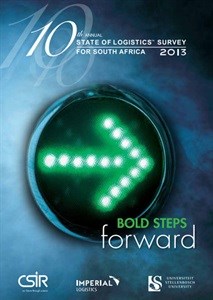
Top stories

Marketing & MediaWarner Bros. was “nice to have” but not at any price, says Netflix
Karabo Ledwaba 2 hours





Marketing & MediaBehind the campaign: Reframing fairness in ride-hailing: The inDrive success story
inDrive 23 Feb 2026
More news

















The survey, recently releases, was published by the Council for Scientific and Industrial Research (CSIR) in collaboration with Imperial Logistics and Stellenbosch University.
The structure of the publication has remained similar over the ten years. This year's survey thus looks back over a decade of measuring logistics costs while for the first time providing a forecast of the current calendar year's costs.
In 2012 the absolute cost of logistics was R393 billion (showing that the correctness of the estimate for 2012 published in the 9th State of Logistics survey was satisfactory. Logistics costs are estimated to have been R423 billion in 2013 and are forecasted to be between R456 billion and R470 billion in 2014, depending on fuel inflation.
Logistics costs as a percentage of GDP have remained at a stable level of 12.5% for 2011 to 2013 and are forecasted to show a slight increase in 2014 depending on the magnitude of fuel inflation. A deeper investigation of individual cost components and cost drivers show that the increase in logistics costs is perhaps not so much the result of deteriorating efficiency in the industry but the disproportionate growth in cost drivers - especially fuel.
The survey reports that South African supply chains have moved beyond survival to optimised mode, where costs, inventories and lead times have been minimised within individual supply chain functions. End-to-end integration of supply chain functions is the next major shift required in South Africa to make business more customer-centric and competitive. An integrated supply chain approach unlocks logistics efficiencies that were previously unavailable, as illustrated by Nissan SA's recent successes.
The public sector needs to create an enabling environment for effective logistics. Appropriate logistics infrastructure and a greater drive towards intermodalism are key enablers to reduce costs and improve performance in South Africa's logistics industry. Investment in rail, road, port, pipeline and airport infrastructure continues to be a high priority for the country with hundreds of billions of rand invested annually in various projects.
"As is the case globally, funding for mega infrastructure projects is a significant constraining factor, thus public private partnerships (PPPs) are becoming essential to realise the country's ambitious infrastructure expansion plans," according to the 10th State of Logistic survey.
The country's national road network has remained in a good condition between 2009 and 2013 under the jurisdiction of SANRAL. Unfortunately, many provincial road networks have deteriorated considerably - partly due to the accelerated wear caused by trucks carrying rail-friendly freight. The survey states that by focusing first on upgrading 'poor' and 'very poor' sections to a 'fair' condition will save more vehicle operating costs than upgrading 'fair' roads to a 'good' or 'very good' condition. The institution of the Provincial Road Maintenance Grant (PRMG) on 1 April 2014 is expected to spur a turnaround in provincial road asset management.
Smart Trucks, a product of the performance-based standards (PBS) initiative driven in South Africa by the CSIR, is a road transport project that holds great promise for increasing transport efficiency in tandem with modal shift imperatives. Demonstration projects have shown average improvements in fuel efficiencies of 14% along with a drastic reduction in road wear and larger payloads which result in fewer trips.
"The global economic situation and rising cost drivers spell out increased competition and tighter margins. Thus driving down the cost of logistics, making South Africa more competitive and capitalising on growth potential in Africa and global commodity markets will require no less than bold steps forward," states the survey. Greater supply chain integration, modal shift, transport efficiencies and successful PPPs will require proactive effort, courage and innovation from both the private and public sectors.
The 10th State of Logistics survey for South Africa is downloadable at www.csir.co.za/sol and at www.imperiallogistics.co.za/stateoflogistics.